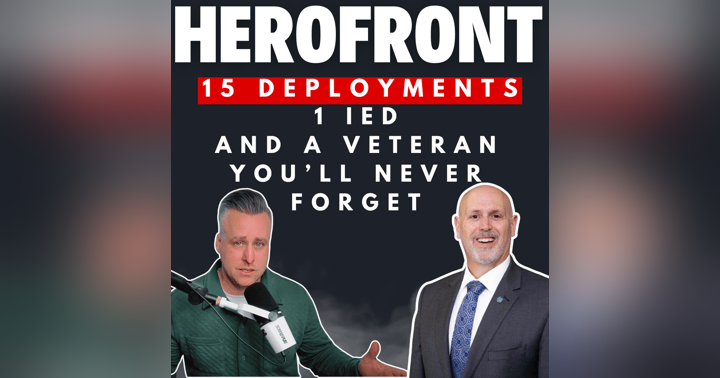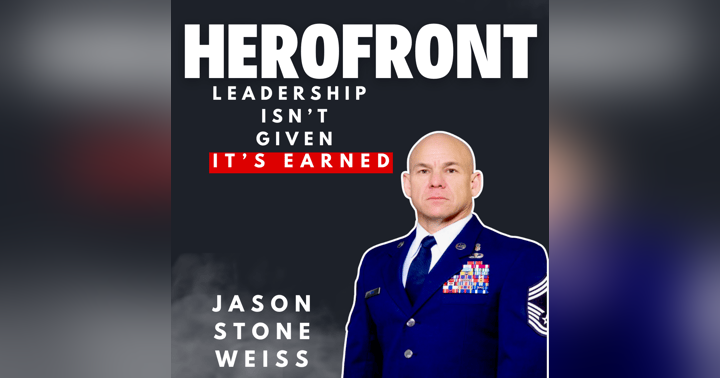Navigating “Freedom Shock” - The Emotional Journey From Military to Civilian Life with Dawnell Kelly

Navigating “Freedom Shock” in the Journey From Military to Civilian Life
By Josh White, Host of HeroFront Podcast
Based on Dawnell Kelly's Veteran Transition Philosophy found here:
The Optimized Veteran Podcast
As I reflect on my 20 years of service in the U.S. Air Force, I thought I had a clear understanding of what life after the military would look like. I was prepared for the change—the shift from a structured, purpose-driven life to a new chapter. However, three months into retirement, I found myself grappling with something unexpected: what Dawnell Kelly aptly calls “Freedom Shock.”
Dawnell Kelly, creator of the Military 2 Civilian Mastery Method, is on a mission to help veterans like myself adjust to civilian life. Her innovative approach to transition addresses not only the practical aspects of finding a job and housing but also the emotional and relational challenges that can often be overlooked. Through her work, Dawnell helps veterans rediscover their purpose, rebuild relationships, and thrive in civilian life after military service. She coined the term “Freedom Shock” to describe the intense and abrupt struggle veterans face when transitioning from a life of structure, camaraderie, and purpose to one that often feels unstructured and isolating.
What is Freedom Shock?
Freedom Shock is the term Dawnell uses to describe the overwhelming transition many veterans face when they leave the military. The sense of identity and purpose that is so deeply embedded in military service can feel stripped away in an instant, and the emotional toll is often underestimated.
Some of the common signs of Freedom Shock include:
• Feeling disconnected or purposeless after months in a civilian job.
• Struggling with identity and self-awareness after leaving the military.
• Facing emotional challenges that strain relationships at home.
• Missing camaraderie but not connecting with traditional veteran groups like the VFW.
• Failing to build meaningful civilian friendships.
For me, it was an intense shift. One moment, I was embedded in the familiar rhythms of military life—working in the med group and surrounded by my team. The next, I was out-processing, moving off base, starting a SkillBridge internship, and figuring out how to navigate civilian culture. The rapid pace of it all was disorienting, and I found myself questioning who I was without the uniform.
The Emotional Weight of Transition
The emotional toll of transitioning from military to civilian life is often more complex than most people anticipate. The process of working with the VA, for example, was not only physically taxing but emotionally draining. My appointment required me to revisit every injury, mental health challenge, and physical ailment I’d accumulated over my two decades of service. That experience alone left me emotionally wiped out, questioning my readiness for the next chapter.
Beyond the physical and emotional strain, the financial uncertainty added to the stress. If your SkillBridge internship doesn’t lead to an immediate job, there can be a three-month gap between leaving the military and receiving retirement or VA benefits. For someone like me, with a family and a mortgage, that uncertainty felt terrifying. Sleepless nights, constant anxiety, and a never-ending cycle of updating my resume consumed me.
Dawnell’s Mission and Framework for Transition
As I navigated these challenges, I found a guiding light in Dawnell Kelly and her Military 2 Civilian Mastery Method. Dawnell’s framework goes beyond just finding a job or a place to live—it helps veterans rebuild their lives from the inside out. Through her work, Dawnell has made it her mission to help veterans overcome Freedom Shock by addressing the emotional, relational, and cultural aspects of transition that many traditional programs overlook.
Here’s an overview of Dawnell’s approach:
1. Find Purpose Before Choosing a Career: Dawnell emphasizes that veterans must first identify what drives them before they jump into any job. Too often, veterans are pushed into the first high-paying job available, only to feel empty and disconnected months later. As I’ve learned myself, chasing a paycheck isn’t the answer—finding your true purpose is the key.
2. Rebuild Relationships: The relationships we have in the military are unlike any other, and when we leave that environment, it can feel incredibly isolating. Dawnell’s framework helps veterans reconnect with their family and rebuild relationships. For me, spending more intentional time with my wife and kids has been instrumental in my transition.
3. Learn Civilian Culture and Communication: The civilian world operates differently from the military, and adapting to this new environment can feel like learning an entirely new language. Dawnell teaches veterans how to navigate civilian culture while staying true to themselves. Her approach offers the tools necessary to build authentic civilian relationships and communicate effectively in a non-military setting.
The Optimized Veteran Effect
Dawnell’s work has far-reaching impacts, both for the individual veteran and for society as a whole. By addressing Freedom Shock and helping veterans successfully transition, Dawnell’s Military 2 Civilian Mastery Method promotes long-term positive effects, such as:
• Increased entrepreneurship and innovation among veterans.
• A stronger workforce filled with purpose-driven professionals.
• Improved workplace cultures and productivity.
• Economic growth and a decrease in veteran homelessness and suicide rates.
By addressing these core issues, veterans are not only able to find fulfilling careers, but they also become catalysts for positive change within their communities and workplaces.
Key Lessons from Dawnell
Throughout her work, Dawnell has learned three major lessons that she now shares with others:
• Purpose Comes First, Not the Job: Dawnell learned the hard way that chasing a paycheck doesn’t fill the void left by military service. She emphasizes that purpose must come before career—purpose is the compass that guides every decision after leaving the service.
• Emotional Strength is a Skill, Not an Expectation: Dawnell shares that emotional resilience requires active work. She once believed she had to “tough it out,” but she now teaches veterans to actively address their emotions before they overwhelm them.
• Relationships Need Intentional Rebuilding: The military teaches us to rely on our team, but civilian relationships are different. Dawnell had to rebuild trust with her loved ones and learn how to form civilian friendships from scratch. This process, while challenging, is crucial for a successful transition.
A Message to Fellow Veterans
If you are going through Freedom Shock, my advice is simple: take a knee. Take a moment to pause and reflect. You don’t have to have everything figured out right away. For me, stepping back from social media and focusing on my family has been crucial. Spending time with my daughter, even on something as simple as a zoo trip, has helped me reconnect with what truly matters.
Dawnell’s work reminds me that we are not alone in this struggle. By prioritizing purpose, rebuilding relationships, and learning how to adapt to civilian life, we can come out of this transition stronger, more connected, and ready for the future.
Looking Ahead: Dawnell’s Impact
As I continue my journey through this transition, I’m excited to share more of my experiences with you on the HeroFront Podcast. I’ll be speaking with Dawnell and other experts to provide real, actionable advice and stories to help veterans prepare for life after service. In particular, Dawnell’s Military 2 Civilian Mastery Method offers an in-depth approach that addresses the emotional, relational, and cultural gaps that traditional transition programs often overlook.
Dawnell’s work focuses on helping veterans:
• Find Purpose before choosing a career, ensuring their next step aligns with their values and long-term fulfillment.
• Rebuild relationships by teaching veterans how to reconnect with loved ones and build civilian friendships.
• Learn civilian culture and communication, equipping veterans with the tools needed to navigate a new environment while staying true to their military identity.
Through Dawnell’s framework, veterans can expect to build emotional resilience, create meaningful careers, and find personal fulfillment. Her approach doesn’t just help veterans find jobs—it helps them find lives they can thrive in.
Stay tuned for my upcoming episode with Dawnell Kelly—it’s one you won’t want to miss.
Josh White
Host, HeroFront Podcast
Giving Veterans a Voice
If you’re navigating your own transition, I highly encourage you to check out Dawnell’s podcast, The Optimized Veteran, where she shares more about her work and provides actionable insights for veterans adjusting to civilian life.
Let’s continue to connect, share our stories, and support one another on this journey.
#HeroFront #Veterans #FreedomShock #Military2Civilian #VeteranTransition #MentalHealth #Resilience





